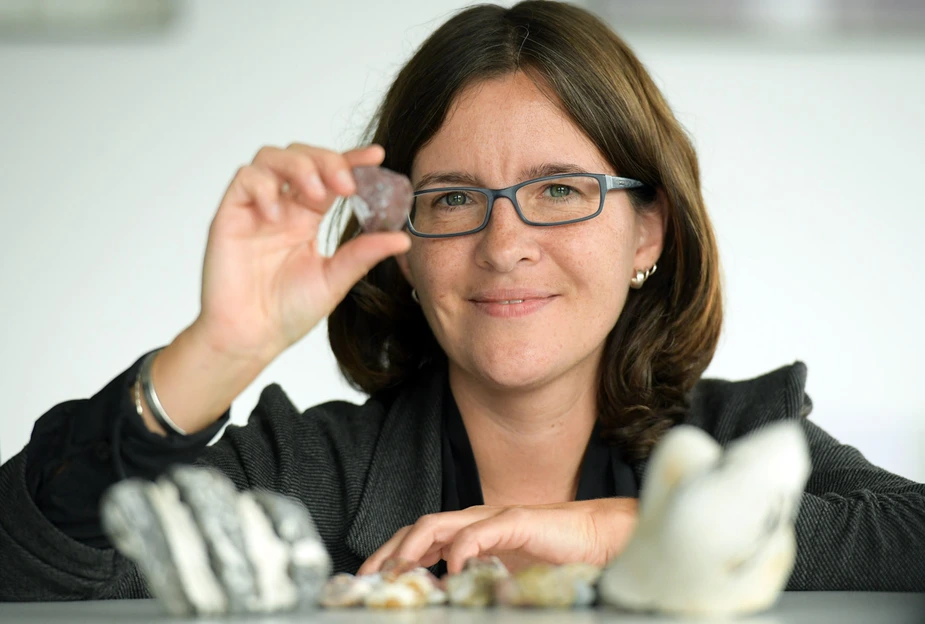Co-responsible for the ifp’s steep growth trajectory
In conversation with food chemist Carolin Poweleit
She’s a food chemist with an appetite for travelling and visiting other countries. Her way of working is highly structured but never goes without using her imagination. She’s is an identical twin but is completely different to her sister. Carolin Poweleit leads a life of many facets. As one of two general managers of the ifp Institut für Produktqualität, she has a tight daily regimen. The Adlershof-based ifp is home to 393 employees; 27 more work at ifp branches in Aachen, Ohrdruf, Leipzig, and Stendal, as well as joint venture projects in Güstrow and Jülich. In this interview, Carolin Poweleit lets us in on her peculiar penchant for stones and why she prefers going on holiday to Greece.
Adlershof Journal: The ifp is growing vigorously with a new building being added every year. Where are you headed?
Carolin Poweleit: We started by building the new ifp laboratory centre in Adlershof in 2013 and have since completed five additional buildings, plus a warehouse. Modern analytics equipment takes up a lot of space. Our newest addition still has some interior work to be done. We are planning to move in early next year.
Who’s moving in?
We will focus our contamination and residue activities there, which includes things like mycotoxins, polycyclic aromatic hydrocarbons, softeners, and pesticides. We have been offering these tests for several years and are now bringing them together them in one cutting-edge central building.
Why is there an increasing demand for analytics activities?
It is the result of two converging developments. On the one hand, we have consumers who are more conscious and aware of health risks and dangers associated with food, especially for people with allergies. On the other hand, modern analytical methods have simply become better at detecting stuff. Then there’s regulation, including the European food safety regulation, which have, for example, set maximum levels for contaminants. Many products now have organic certification. All these things have got to be tested.
Does the ifp offer tools for private households?
Yes, a water quick test. We are planning further test kits soon, including tools for hobby gardeners to test their vegetables for pesticides.
Have you ever had food poisoning?
No, surprisingly not, seeing as I am not overly cautious with food at home.
Why did you want to become a food chemist?
I didn’t originally want to. When I was at school, I was sure I wanted to become an interpreter or a tour guide. However, I was good at science. After finishing school, I was open-minded and did an apprenticeship as a so-called biological technical assistant at the Lette-Verein. I found food technology to be the most intriguing, but I was more into biology and chemistry, so I decided to study food chemistry at the Technical University in Berlin and also took the state licensing examination in food law.
When did you first get in contact with Adlershof?
My grandmother lives in nearby Köpenick, so I’ve known Adlershof since I was a child. I first saw the Technology Park in 2014.
How do you get to work?
I used to live in Prenzlauer Berg but moved to Köpenick to shorten my commute. Now it takes me 25 minutes to get to the institute on my bike.
When did you last try something new?
I would love to be able to play an instrument. I usually begin with much enthusiasm but tend to give up just as quickly. Earlier this year, I bought a harmonica and a matching textbook. I also own a ukulele. Unfortunately, I lack the time and, so I found, also the patience. Then I quickly find other new fun things to do like riding motor scooters.
Are you scared of anything?
I am scared of heights. I’m also not so fond of high speeds. A reason why I bought a motor scooter in the first place, was to test my limits in this department, though most veteran bikers would probably laugh at my 50 km/h. Again, I don’t use it much because getting to work is more convenient on my bike. I just ride around the traffic.
What do you do in your spare time?
I collect stones, use them to decorate my flat, or play with them when I’m feeling stressed. Sometimes I craft them into jewellery and décor and give them away as gifts. Most of them I bring back from my travels. The beaches in Greece have the most beautiful stones. I’m quite sure that someday I will buy a sanding and polishing machine and tile my bathroom with all my self-collected, polished treasures. What else do I like to do? My best friend has an allotment garden in Altglienicke, which I can always use. I go there often to do some gardening, some weeding, or just to lie in my hammock. Obviously, I make time for my family and friends, and spend the rest of my time reading and getting some exercise.
Interview by Sylvia Nitschke for Adlershof Journal
